 |
International Affairs
Filming the Great Deception
Jeffrey R. Nyquist
Cinematographer Robert Buchar is attempting to put together a documentary feature film about the end of the Cold War and the collapse of Communism in Europe. Its working title is The Grand Deception – Uncertain History. Based on interviews with former Communist Bloc intelligence officers, CIA officials and scholars, the documentary shows that Communism did not collapse spontaneously. The directive for change came from Moscow. “People power” had nothing to do with it.
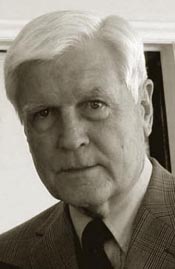
Former CIA chief Bagley: the collapse of Communism was a maneuver |
According to Buchar, “For the last three years I couldn’t find any media interested in this topic.” Pundits and news anchors told us, again and again, that the revolutions in Eastern Europe were caused by popular discontent. According to conservative partisans, the Soviet Union fell because Ronald Reagan pushed it over. Not so, says Buchar: “The version of events presented to the public is very different from what actually happened.”
On this subject, Buchar interviewed various insiders and analysts. Former chief of CIA Soviet Bloc Counterintelligence, Tennant H. “Pete” Bagley told Buchar that an unknown hand was behind the collapse of Communism in Eastern Europe. “There was a different truth in this respect,” Bagley said. “and that’s a truth that was so well hidden that I don’t know if it ever will come out…”
According to Ludvik Zivcak, a Communist secret police official tasked with organizing the demonstration that triggered the Velvet Revolution in Czechoslovakia, “Many people think or believe that in 1989 there was a mass uprising of the nation. From what I did, or where I worked, I am convinced that there was no uprising at all. It’s hard to find out today who wrote the script but it wasn’t written in America. America just jumped on the bandwagon at the end. So, the script was most probably written in the East.”
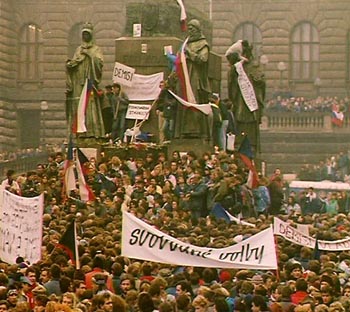
In 1989 the "velvet revolution" in Czechoslovakia was an orchestrated event. "By whom?" asks Buchar |
According to the Soviet dissident researcher and former political prisoner Vladimir Bukovsky, “The KGB was an integral part of the whole of Gorbachev’s perestroika.” Bukovsky told Buchar that the West: “never understood the Soviet system as such,” failing to comprehend “why it was inherently aggressive,” and dangerous. The West made useless treaties with Russia, “As if a piece of paper could ever stop that monster.” The West did not understand Stalin, Khrushchev or Brezhnev, and would never grasp the sinister side of Gorbachev’s peace offensive. “So they would all believe nonsense,” noted Bukovsky, “incredible nonsense, to believe that there is a struggle between reformers and conservatives in the Politburo and the leadership.”
At the end of the Cold War, at the Malta Summit between President Bush and Mikhail Gorbachev, the following exchange was recorded for posterity: Secretary of State James Baker raised the issue of upholding Western values and the Russians became upset. President George H.W. Bush intervened with a decisive comment: “Let’s avoid careless words and further discussions about ‘values.’ From the bottom of our heart we salute upcoming changes.”
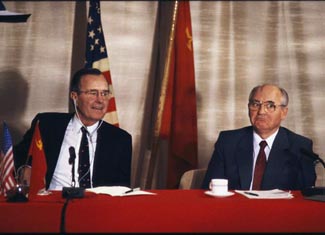
Bush pretended he and Gorbachev were
on the same page at the Malta Summit |
This is what the Russians wanted to hear. American values and assistance in the fall of Communism were not welcome because the KGB was setting up its own version of democracy, and its own version of capitalism. Bukovsky interprets the Malta exchange as follows: “Simply, Gorbachev told Bush that he is going to change regimes in Eastern Europe completely… but he seriously asked the United States and Western allies not to get involved. Not to stir up trouble there. Because it’s very fragile, a very delicate transition period. ‘We will do it, don’t worry, but don’t get involved. Don’t spoil it.’ And Bush promised not to get involved.”
So, the changes were initiated from Moscow and the United States was told to stay out of it. It was the business of the KGB to manage the collapse of Communism, and now we see – more clearly than we did in 1991 – where this collapse has taken us. Europe’s attitude has shifted against American foreign policy. To our consternation a KGB officer is president of the Russian Federation. Former agents and officials of the secret police are leading many of the “former” Warsaw Pact countries. The oppression of dissent is carried out by gangland-style assassinations (as in the deaths of Anna Politkovskaya and Paul Klebnikov). The jailing of dissidents is carried on under legal pretexts.
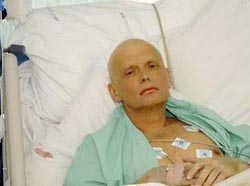
On his deathbed Litvinenko, above, accused Putin of murder |
Czech journalist and politician Jan Stetina told Buchar, “After a few years it became clear that the term ‘fall of Communism’ doesn’t reflect reality. The excitement didn’t last for long and I would say that now we are in a state of disillusionment.” As Czech dissident and former political prisoner Petr Cibulka explained: “I was released from prison ten days after November 17 [1989] and for the first couple of weeks I believed that changes were happening. But after a few weeks I realized that the changes were just cosmetic changes, changing of the scenery; that the power would remain in the hands of the Communists and that the Communists don’t need to worry about losing anything.” Cibulka further stated, “This is not a revolution but another Communist swindle.”
Former Czech political prisoner Vladimir Hucin told Buchar, “I signed Charter 77 after I was released from prison in 1986. When I later got access to documents from the STB [Communist secret police] archives I discovered how many people from Charter 77 were involved with the STB, how many agents the STB had in this group. That was a big disappointment for me.”
As Czech historian Pavel Zacek confirmed to Buchar, “The STB functioned very effectively. They infiltrated all regional opposition groups. They managed to place their agents in the top leadership positions of Civic Forum and recruit new agents within Czechoslovakia’s popular social democratic parties. There were no documents found about how this operation was run…”
Robert Buchar is a cinematographer from Czechoslovakia who defected in 1980 and came to the United States in 1981. He worked as a cameraman for CBS, and since 1990 he has taught cinematography at Columbia College, Chicago.
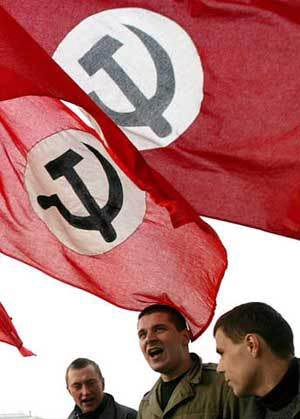
The hammer and sickle flies openly in Russia |
In 1999 Buchar produced the documentary film Velvet Hangover which was turned into a book in 2003 titled Czech New Wave Filmmakers in Interviews. “It was the work I did on this book that led me to the idea to shoot this film,” Buchar explained. “And it was the former Czech dissident and political prisoner Petr Cibulka who convinced me to do it, telling me, ‘If you are not going to make this film, nobody ever will.’ So I started to work on this documentary, The Grand Deception – Uncertain History, in 2004 and finished the principle photography in June 2007. I am editing the interviews now, but everything is on hold pending the problem of raising money to buy stock news footage necessary to finish the film. Maybe I will have to publish the book before finishing the film.”
As a former citizen of Communist Czechoslovakia, what did Buchar learn from his interviews? “You have an idea about an event beforehand,” said Buchar, “and it changes when you hear all the details from eye-witnesses. And then, of course, connecting the dots from different places leads to a horrifying picture and a conclusion that concerns me. People usually give me that weird look when I say that I decided to defect from my country because, back in the late 70s, I came to the conclusion that the process of changing the system was already underway and when it would happen, it would be orchestrated from inside with the outcome predetermined and unacceptable to me. I just didn’t think it would come so soon. I would have given it ten more years at the time.”
Readers may wonder what Buchar thinks about the Western response to the collapse of Communism. “Well,” he said, “there was one thing I learned that I wasn’t aware of before – the level of incompetence in the CIA as far as their knowledge of the Communist system is concerned, the way it operated in Eastern Bloc countries, ignoring the importance of ideology and the level of Soviet infiltration in the agency. Something that Bill Gertz calls the anti-anti-Communist mindset in the agency. That was really shocking for me.”

Posted October 17, 2007

Reprinted from
Geopolitical Global Analysis
You may contact Mr. Jeffrey R. Nyquist at
jrnyquist@aol.com

Related Topics of Interest
 CELAM in Cuba: “Cordial Dialogue” between Wolves and Shepherds CELAM in Cuba: “Cordial Dialogue” between Wolves and Shepherds
 Coming Home to Lenin Coming Home to Lenin
 Moscow: Past Is Present Moscow: Past Is Present
 JPII Supporting Communism in Poland JPII Supporting Communism in Poland
 "Trust the Communists," says JPII "Trust the Communists," says JPII
 Declaration of Resistance to the Vatican Ostpolitik Declaration of Resistance to the Vatican Ostpolitik

|
International Affairs | Hot Topics | Home | Books | CDs | Search | Contact Us | Donate

© 2002- Tradition in Action, Inc. All Rights
Reserved
|
 |
|